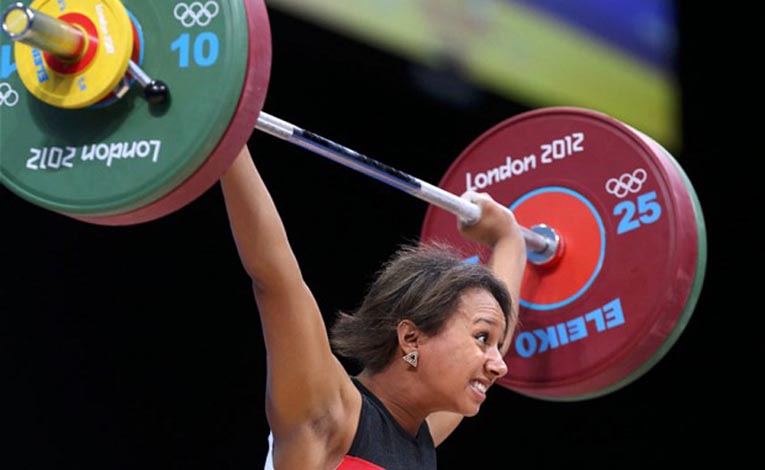As the British Weightlifting Championships kick off, Victoria Northbrooke charts the rise of women’s weightlifting (and the amazing story of how it won funding from the men’s sport)
Women in the gym are no longer confined to fluffy aerobics and dance classes – instead they’re taking over the weights room.
You only have to look around your local gym to see the change.
In 2011, just 0.9 per cent of women were engaged in weight training. And although there are sadly no more recent statistics than that, there can be little doubt that women and weights are experiencing something of a boom.
Part of it is due to the Sport England #ThisGirlCan campaign which aims to encourage girls into sport using realistic portrayals of women sweating, groaning and fighting their way through satisfying exercises.
It’s also down to the rise of ‘CrossFit’ training in gyms, a form of full body training that includes Olympic lifts. The viral #liftlikeagirl hashtag captured this interest in strong women lifting weights.
But, as well as social media and gym classes, we also have professional sports women to thank. More of us are coming round to weight training because of what’s happening at an international level.
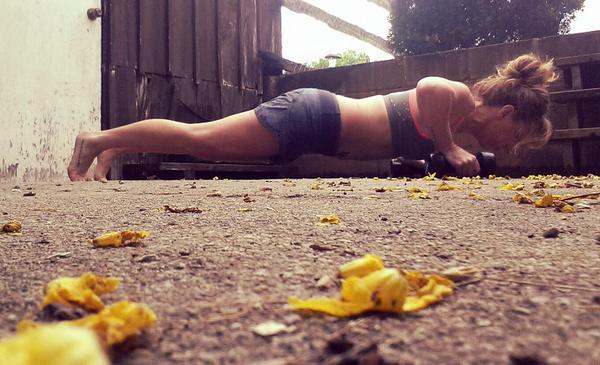
Female weightlifters are in the public eye more than ever before. Take Commonwealth Gold Medal winner Zoe Smith who represented GB in the 2012 Olympics.
Back in 2010, Smith was trolled online and subjected to vicious abuse. Accused of looking like a man, she was told to ‘get back in the kitchen where she belongs’.
Four years later she broke a Commonwealth record and won gold.
“There are still some negative people and sadly you will always get that, but the sport is really is taking off,” she says. “Women’s weightlifting has evolved dramatically in the last couple of years.
“Back when I started out there were only one or two of us and we weren’t even competing internationally. Now we have an all-female British Weightlifting Squad.”
The squad was only formed last year in June 2014 (previously men and women competed in the same team) in time for the Commonwealth Games, and most of the members will be competing individually tomorrow at the start of the British Weightlifting Championships 2015 at the Ricoh Arena in Coventry.
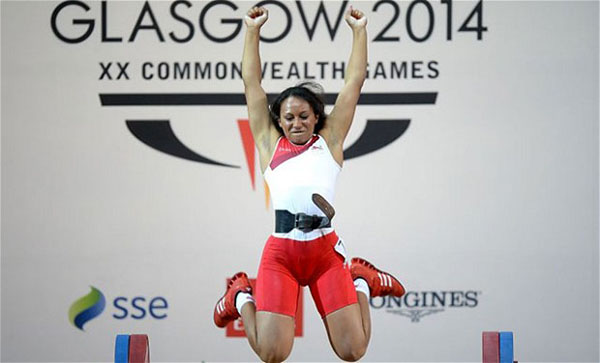
A lot has changed for women in weightlifting in the last few years, and Smith has been at the forefront. The petite 21-year-old started the sport aged 12, and has now become its poster girl.
Not only is she incredibly talented, she doesn’t look like a stereotypical bulked-up weightlifter – she’s just in really good shape.
If you want to get in shape, ditch the lady weights and hit the iron
It means she’s one of the new female weightlifters breaking through traditional barriers in the sport by destroying the old weightlifting cliches that said women weren’t strong enough to compete, or that they’d become ‘masculine and unattractive’.
Another of those women is Sarah Davies, a full-time PE teacher from Leeds who, like Smith, is a member of the British Weight Lifting (BWL) all-female elite squad. She’s also a beauty queen who won Miss Leeds in 2012.
Davies was a gymnast before she started dating Olympic weightlifter Jack Oliver. Bored one day, while waiting for him during a training session, she decided to ‘have a go’ herself.
It turns out she was actually pretty good – so much so that this month she finished ninth in the European Championships and is now one of the BWL’s hopefuls for the Tokyo Olympics in 2020.
Like Smith, she doesn’t ‘look like a weightlifter’. It’s this, along with the growing popularity of weights, that has helped create a new standard of female sporting beauty.
Size zero has been eschewed for a strong athleticism. Now, women are lifting their way to bodies sculpted with muscle – and they’re not afraid to show it.
“If you look at our national GB weightlifting team all the girls look just like any other girl you would see walking down the street,” explains Davies.
“Except they can throw twice their own bodyweight above their heads.
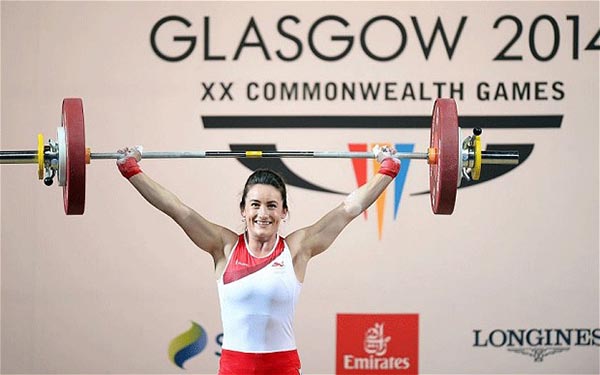
“I love how much perceptions are changing in this sport and can’t wait to see where women’s weightlifting will be in another year.”
Women’s weightlifting is changing rapidly, and a lot of it is down to UK Sport. Last year, the organisation made the landmark and controversial decision to cut men’s weightlifting funding.
It chose instead to channel its efforts into supporting the women, based on statistics that showed a greater chance of Olympic medals with the formidable Smith and rising stars such as Davies and Mercy Brown.
UK Sport director of performance Simon Timson explains: “We invest in sports and athletes with the potential to win medals at Olympic or Paralympic Games in an eight year period.
“British Weight Lifting presented us with a compelling strategy for developing their most talented athletes, who are all female, with a view to challenging for medals by Tokyo 2020, and we are supporting that plan.”
That support led directly to the creation of the all-female team last year, but it was also channelled into the BWL’s Golden Chance programme, dedicated to discovering new talent and future women’s weightlifting champions.
The idea is that up-and-coming female athletes are given a chance to develop their potential, and the best will win a place on the all-female elite squad and a chance to compete for a medal at Tokyo 2020.
Stuart Cummings, national development and education manager for BWL, adds: “We went gym to gym, door to door, searching for women who could cross over from other sports. ‘CrossFitters’, athletes and gymnasts, even female surfers have joined the programme and are now discovering their potential in weightlifting.”
On April 16, 2015, eight finalists were selected from hundreds of applicants to progress to the next stage of the Golden Chance programme. They began a three month accelerated development programme with full access to BWL performance support, coaching, nutrition and physiotherapy.
Grace Lilley, a 21 year-old fitness instructor from Surrey, is one of those eight athletes. She says the experience so far has been ‘life changing’.
Lilley discovered her love of weightlifting through her local CrossFit gym and went on to join Sutton and Epsom Weight Lifting Club. She says the first two phases of the selection process were brutal: “To be honest, I was blown away by the standard of the competition” – but that’s part of the joy of weightlifting.
“Nothing compares to it,” she says. “I feel so strong, so powerful, like I can do anything.”
Clearly women’s weightlifting is experiencing a renaissance. But it’s not just elite sportswomen who are leading the way.
Rising Instagram star Penny Pearson is a budding weightlifter, who loves to lift outside the gym.
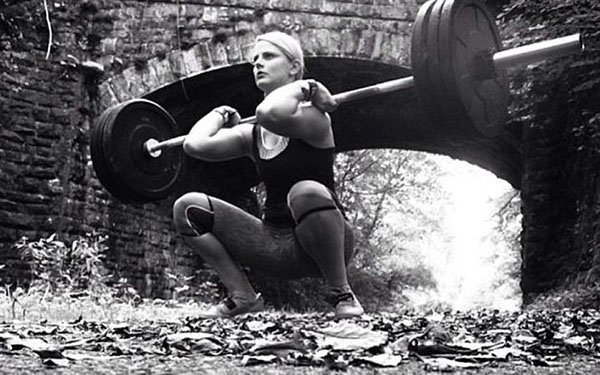
The sales assistant from South Wales fills her account with inspirational images of her lifting her weighted barbell anywhere from sunset beaches to abandoned buildings.
She also discovered weightlifting at her local CrossFit gym and took it up seriously after suffering an injury that prevented her from running. She hasn’t looked back since.
The CrossFit phenomenon has created growing interest in women’s weightlifting by making it more accessible. It has introduced a whole new generation of women to weightlifting.
Smith says it has “been a major influence and it’s been wonderful to hear so many women say how much they love the weightlifting aspect of it because they find it so empowering.”
Equally exciting is the fact that women’s weightlifting is filtering down to girls at school. Michaela Breeze, who’s won two gold medals and came out of retirement to break two British records and a Commonwealth games record, is now championing the sport to young girls.
She’s training the next generation of young female weightlifters at her own gym, Breeze’s. Not only has she produced a British Junior Champion, she’s also given confidence to tens of young women.
Ellie Pryor, 13, who represents Wales internationally says: “If it wasn’t for weightlifting I’d never have known what I’m capable of.”
Reigning Commonwealth champion Smith agrees, and says that other young girls and women should give it a try.
“Check out a British Weight Lifting club for yourself,” she urges. “They are so welcoming. All you need is a pair of trainers and a good attitude. The weightlifting world is one of the most supportive, welcoming and friendly communities. They will be really happy to see you.”
So grab your trainers ladies, and go #liftlikeagirl – it might just change your life.
10 reasons to lift weights
- You will develop a stronger, healthier body
- You will have more energy
- You will sleep better
- Your heart health will improve
- You reduce the risk of osteoporosis
- You burn more calories, even when resting
- You reduce your risk of type II diabetes
- Your mood will improve
- You can sculpt killer curves
- You’re NEVER too old to benefit
Courtesy of: Telegraph UK
